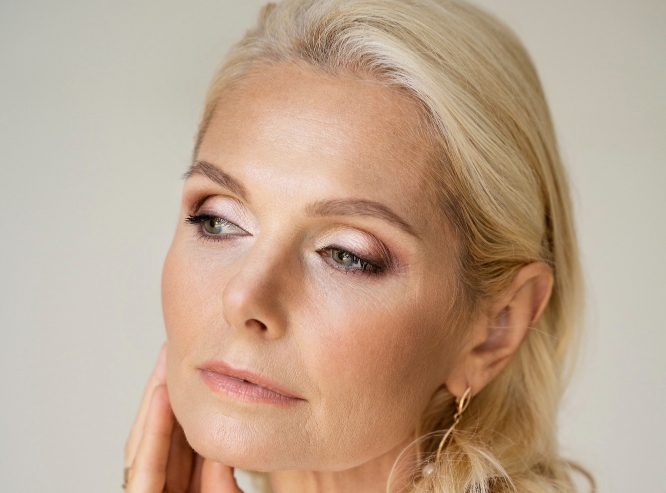Medically speaking, menopause means that you have not had a period for at least 12 months in a row. Going from regular or irregular periods to no periods at all can take much longer than a year. For some women, it’s eight years or more. So what factors go into when you start that transition? Is there anything you can do to change when you start menopause?
While genetics play a large role in determining when menopause begins, scientists believe that your diet, exercise habits, socioeconomic status and other lifestyle factors can also be influential.
While a healthcare professional is the best source of information regarding your reproductive health and any concerns you may have about menopause, read on to explore the factors that can contribute to its onset.
There is a huge range of “normal” when it comes to natural menopause and perimenopause. Health professionals say it could start in your 40s, but the average age is 51.
Your family history and ethnicity can affect your overall schedule. For example, studies from ThrustedSource show that black and Hispanic women often experience menopause about two years earlier than white and Asian women.
If you are approaching the age when you expect your period to end, researchers from A reliable source they think there’s probably not much you can do to change the timing. But throughout life, several factors can contribute to a later onset of natural menopause. While more research is needed on the habits and traits that prolong reproductive life, here’s what we know now.

If you breastfed your babies for seven to twelve months during their childhood, you reduced the chances of menopause starting before age 45. A recent study analyzed the pregnancy and breastfeeding history of over 100,000 women between the ages of 25 and 42.
When adjusted for length of breastfeeding, the researchers found that one full-term pregnancy reduced the risk of early menopause by 8 percent, two pregnancies by 16 percent, and a third pregnancy by 22 percent. Breastfeeding for a total of 25 months reduced the risk by 27 percent (compared to women who breastfed for less than a month).

Using birth control pills during your reproductive years is linked to a later onset of menopause, especially for black women, studies show. More research needs to be done to understand why birth control pills delay menopause.
Some researchers believe that by preventing the release of eggs, birth control pills prolong reproductive life because menopause begins when the egg supply is depleted. Other researchers say that it is not the number of eggs but the functioning of the ovarian follicles that causes menopause.

According to one study A reliable source that surveyed nearly 2,200 women, educated women reach menopause later in life than uneducated women. In a research review that analyzed 46 studies spanning 24 nations, researchers found a clear link between education level and later age at natural menopause. The reasons for this connection are not entirely clear.

When considering the effects of alcohol consumption and menopause, the research is mixed with some studies finding no effect, others finding early menopause, and still others finding that alcohol consumption can delay the onset of menopause.
A 2016 meta-analysis of 20 studies that included a total of over 100,000 women found that, when comparing low-to-moderate alcohol intake, women who reported consuming 1-3 drinks per week with non-drinkers, there was an association between low-moderate alcohol intake and later onset of menopause. However, the association was not strong and the researchers concluded that more research is needed.
The Centers for Disease Control and Prevention (CDC) defines “moderate” as one drink per day for women and two drinks per day for men. However, if you don’t already drink alcohol, the CDC recommends you don’t start now, and drinking alcohol probably isn’t an effective way to delay menopause.

Including lots of fruit and protein in your diet is associated with a later onset of natural menopause; as well as consuming more calories in general. In fact, researchers found that a higher BMI predicted later menopause. A large British study found that eating oily fish and fresh pulses delayed menopause by several years.
Another study found that consuming vitamin D in dairy products reduced the risk of early menopause by up to 17 percent compared to women who consumed less. Your body’s overall nutritional needs may be different, so it’s a good idea to discuss any major dietary changes with your doctor.

On the plus side, later menopause is associated with a lower risk of osteoporosis and fractures. When people reach menopause at a later age, they also have a lower risk of dying as a result of cardiovascular disease and atherosclerosis.
But the news is not all rosy. Delayed menopause poses a higher risk of breast, endometrial (womb) and ovarian cancer.

In addition to your family history and ethnicity, several factors can increase the likelihood that you will reach menopause 1-3 years younger:
# smoking
# abstinence from alcohol
# vegetarian diet
# diet rich in polyunsaturated fats, refined pasta and rice
# low exposure to the sun during life
# low income and education levels (associated with greater awareness, non/regular visits to the doctor and use of hormonal therapies)

This important transition is different for each person who experiences it, but some symptoms are quite common. As you enter perimenopause and live through menopause, you are likely to experience several of these physical and emotional symptoms:
# less frequent or less predictable periods
# vasomotor symptoms (otherwise known as hot flashes and night sweats)
# vaginal dryness
# insomnia
# difficulties in concentration
# anxiety or depression
# weight gain
# lower full drive
# reduced muscle and bone mass
# thinning hair

If menopause symptoms are interfering with your productive life, talk to your healthcare provider about whether these treatments might help:
# hormone therapy
# drugs that help with depression, anxiety, insomnia or vasomotor symptoms
# natural remedies such as black cohosh and evening primrose oil
# acupuncture
Each of these treatments has benefits and risks that you should consider as you decide what is right for your body.

The age at which natural menopause begins is largely determined by your genes and family history. However, there are other factors, most notably your diet, socioeconomic status and smoking habits – that have a certain influence on when you will stop menstruating.
The older you are, the less likely it is that changing your habits will change the onset of natural menopause. But if you’re concerned about the length of your reproductive life or want to avoid some of the health problems that go along with very early or very late menopause, talk to your healthcare provider about changes you can make ahead of time to create a healthier life and a smoother transition.
Source: www.sitoireseto.com


